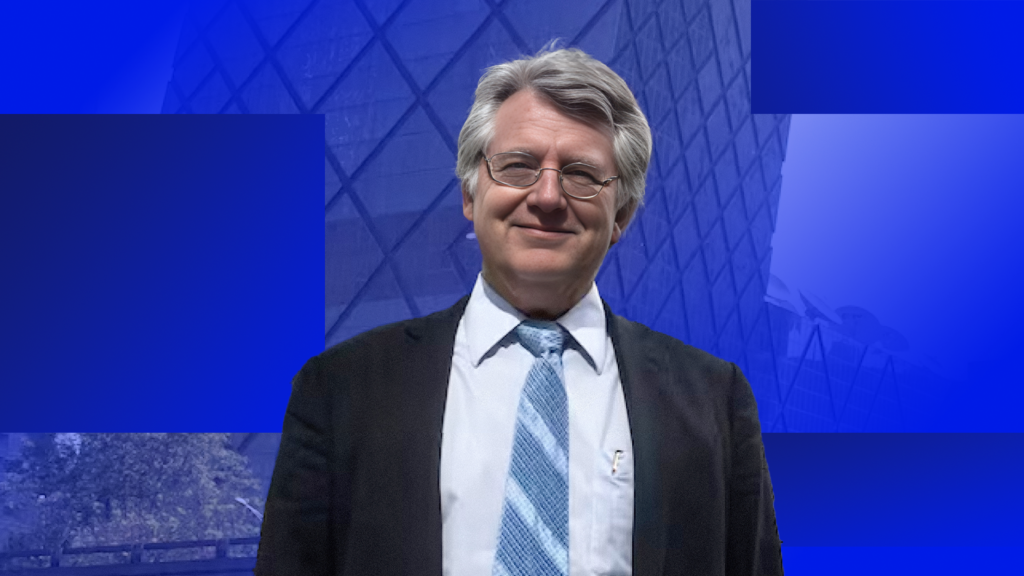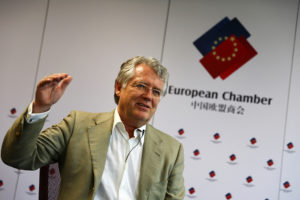
Exit intrview with Jörg Wuttke
Jörg Wuttke has just stepped down as president of the European Chamber, after serving a third and fourth term back-to-back, all while balancing an enormous workload and dividing his time between Chamber tasks and his day job as the head of BASF in Beijing.
In an interview hosted by the European Chamber’s podcast, China Dispatches, he looked back at his prolific work at the Chamber. Here are some excerpts from that interview.
The podcast episode with the full interview is available on the Chamber’s social media platforms and website: https://podcast.europeanchamber.com.cn
As one of the founding members of the European Chamber and president for several terms during its 23-year history, you have witnessed the Chamber grow from an idea into an organisation representing over 1,700 members across China. What aspects of the Chamber’s work are you most proud of?

I think that the area that we can be most proud of is the national voice that we have created. We are a nationwide chamber with nine offices in seven chapters. And I think we have definitely made our voice heard nationwide through our local position papers. We were taking baby steps again and again in the right direction, engaging with local governments and media, and leading the local chapters to speak up. So we are not just ‘Radio Beijing’.
I’m most proud about the fact that this is the most unified chamber. I spent four terms at the steering wheel, and it has been an incredible ride.
Could you give some examples on where the Chamber moved the needle the most?
Besides making lots of noise, producing many pages, I think we actually get things done.
In late 2016, capital transfers were impaired. I didn’t see any resolution, and letters to the relevant authorities were left unanswered. I went public in the Financial Times and ended up on page one. The next day I had my appointment, and six weeks later, the problem was resolved.
We also tried really hard to change the ‘zero-COVID’ policy. We went public in a very strange manner: our letter got leaked. It was a social media hit at the time, garnering a lot of attention. It was also very much welcomed by a couple of interlocutors in certain ministries who said, “Great, you kickstarted a policy debate.” While we did move the needle, it took Omicron to take over the country in December 2022 for a real shift to happen. But sometimes you lose, sometimes you win.
In your capacity as president, you had several meetings with key interlocutors from both the European Union (EU) and China. What was your process for preparing for these high-level meetings?
A meeting like the one I had in May 2022 with the [former] Premier of China, Li Keqiang, takes 20 years to prepare for. It takes credibility, accountability and relevance. I think the authorities have realised that we are noted in the big cities of China, that we have traction with members, that we are extremely engaging with media. We matter, we are on the radar – and I think that’s really the precursor for getting these appointments.
Why do you think we have been able to maintain such good access to both the Chinese and European authorities?
Because we are ‘fact-rich’. We come out with a 430-page-long position paper, and we get things right. And sometimes what we say might be uncomfortable for Chinese interlocutors and strange for Chinese media – or even for some of our members. When we are pointing at issues, some of the reaction we get is: “How can you be so critical?” But I think it is also clear to everyone that we don’t just highlight problems to look smart or to try to make China look less smart. Simply put, our message is that China should not become complacent, and that China actually has the ability to get better. But you cannot get better by only getting praise for what you have achieved already. You can only get better by addressing the shortcomings.
You’re also very well known for your engagements with media. What strategy did you follow as president?
My friends would say that maybe I have a very high vanity level and I have a constant need to find my name printed in the papers. While there might be some truth to this, being accessible is also a way to keep media engaged with us. Journalists know that they can call me up on my mobile phone – and often it’s these three- to five-minute-long phone-calls that will inform their reporting. So you need to be candid and authentic, and you also need to convince journalists that it is something they can sell to their editor.
It is also important to understand that media engagement is not totally lopsided. It is very often my media contacts that are the first to share certain news with me. They are also, in many ways, my coaches and my trusted partners, whose feedback I rely on to get my messaging right.
You have also been a big supporter of our events. Can you recall a Chamber event or guest speaker that left a particularly strong impression on you?
Events sometimes get under your skin. To me, one of the most memorable ones was when we had Sidney Rittenberg tell his life story to a ballroom full of people. Sidney Rittenberg, an American, was among those who actually did the Long March with Mao Zedong. There is an iconic picture of the two of them standing side-by-side on the veranda looking down on Tian’anmen Square. And he was also imprisoned in China for years, as he was accused of collaborating with anti-communist forces. Him recounting the story of his life really got under your skin.
Another event I remember very clearly because I was in absolute panic took place in Brussels. Bo Xilai and Peter Mandelson were in the audience. I was the keynote speaker, and I had prepared slides but, for whatever reason, the staff at the Commission put up the wrong slide deck. As a speaker, you depend on these slides. It was especially the case here, as I didn’t take notes along. When I saw that nothing was working, I decided to keep talking in the most colourful language possible to get the message across, while trying to recall what I actually wanted to say. Mind you, to recall what you wanted to say when you are full of adrenaline, and you have two ministers looking down at you, is not an easy feat. I was possibly sweating profusely by the time I got this over with and sat down thinking, “Jesus Christ, how was that perceived?” And I remember that Mandelson came to me and said it was the most astounding speech he had ever heard outside the House of Commons, because I made it happen without the slides, all impromptu. I must say that getting praise from a such a master of eloquence as Peter Mandelson really made my day.
What does the future hold for you now that you are relieved of your Chamber duties, including 6am media interviews and back-to-back meetings with government officials?
I must really thank my own company, BASF, for being the partner and the supporter that it has always been in all these 10 years on the frontline.
As hard as it might sound, it was clear that I have to do my job first, especially that it was my job that I got paid for. This sometimes left very awkward timing for my tasks. I would get up very early in the morning, and while in the evenings I tried to be at home for dinner with the boys, afterwards I had to go back to my job again. It was a massive workload.
My family certainly was affected, and especially so over the last three years as we had no real vacation. Our only option was to vacation in China, but staying in the same time-zone meant that some pressing task would always come up. So first of all, I am going to spend more time with my wife.
I will finally also start to read more books than I buy. I have a bit of an overload back home. I will also find the time to have a whiskey in the evening, because long hours meant that you had to remain sober. And jazz. I love jazz, it’s my inspiration. I’ll find more time to listen to music or go to concerts late in the evening, now that I don’t have to get up at 5:30 every morning.


Recent Comments